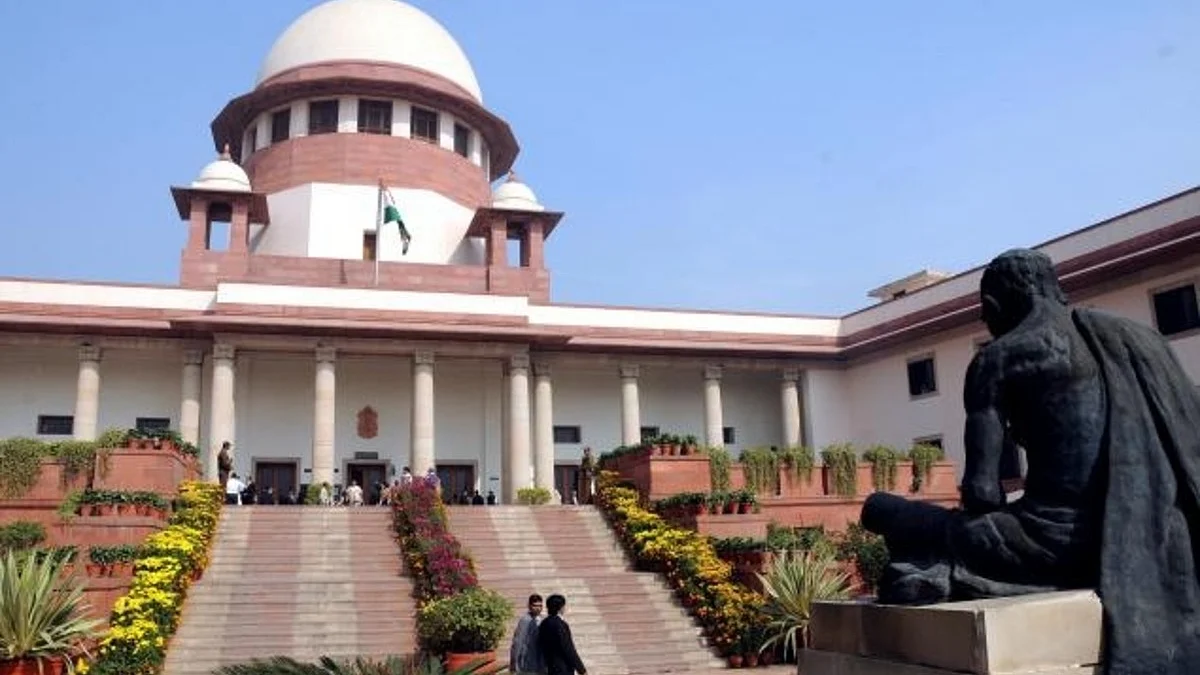Supreme Court upholds 10% reservation for Economically Weaker Sections
A five-judge bench comprising Chief Justice of India (CJI) UU Lalit, Justices Dinesh Maheshwari, S Ravindra Bhat, Bela M Trivedi and JB Pardiwala delivered the judgement

The Supreme Court, on Monday, 7 November 2022, with 3-2 majority upheld the constitutional validity of the 103rd Constitution Amendment 2019, which provides for 10 per cent EWS reservation amongst the forward castes.
A five-judge bench comprising Chief Justice of India (CJI) UU Lalit, Justices Dinesh Maheshwari, S Ravindra Bhat, Bela M Trivedi and JB Pardiwala delivered the judgement. There were three concurring judgements with Justice Ravindra Bhat delivering a dissenting judgment. CJI Lalit said he agreed with Bhat’s opinion in its entirety.
The bench read out that in view of the “majority judgements by justices Dinesh Maheshwari, Bela M Trivedi and JB Pardiwala, the challenge raised to 103rd Constitutional Amendment through writ petitions stands disposed off”.
Justice Dinesh Maheshwari held that EWS quota does not violate the basic structure of the Constitution. Exclusion of classes covered by 15(4), 16(4) does not violate the equality code and does not damage the basic structure, and the breach of 50 per cent ceiling limit does not violate the basic structure of the Constitution.
“Reservation is an instrument of affirmative action so as to ensure an all-inclusive march towards goals of egalitarian society. It is a means of inclusion of any class or section so disadvantaged. Reservation on economic basis does not violate basic structure of the Constitution,” stated Maheshwari.
Concurring with Maheshwari, Justice Trivedi, in a separate judgement, noted that the legislature understands the needs of the people and it is aware of the economic exclusion of people from reservation. Treating unequals equally violates equality under the Constitution. She observed that the impugned amendment has to be treated as an affirmative action by the Parliament for the benefit of EWS class and cannot be said to be an unreasonable classification.
She also wanted to take a re-look at the concept of reservations. “It cannot be gainsaid that age old caste system in India led to introduction of reservations and so that SC/ST get level playing field. What was envisioned by the framers of the Constitution that the policy of reservation must have a time span has still not been achieved even after 75 years,” observed Trivedi.
She pointed out that the reservation for Anglo Indians in Parliament has come to an end, so likewise there should be a time limit for SC/ST reservations.
While agreeing with Maheshwari and Trivedi, Justice Pardhiwala held that reservation is not an end, it is a means and it should not be allowed to become a vested interest. He also insisted that reservation should not continue for an indefinite period of time, so that it becomes a vested interest.
In a powerful dissent, Justice Ravindra Bhat highlighted that the Indian Constitution does not permit exclusion and this amendment undermines the fabric of social justice, and thereby its basic structure. CJI Lalit stated he agreed with Justice Bhat’s observations in its entirety.
"Economic destitution, economic backwardness is backbone of this amendment and on this account amendment is constitutionally indefeasible. However, excluding the classes such as SC/ST, OBC is not constitutionally permissible," held Bhat. This amendment is discriminatory as it excludes the poor amongst the SC/ST/OBC from economically backward classes.
He highlighted that this amendment gives people the impression that the social and backward classes benefitting from reservations are somehow better placed. Most of the poor belong to classes mentioned in 16(4) and 16(1).
“This court has held that 16(1) and 16(4) are facets of same equality principle. What is described as benefits cannot be understood as free pass, it is a compensatory mechanism to reparate. Permitting breach of 50 per cent would result in compartmentalisation. The fraternity principle is deeply embedded (in the Constitution),” observed Bhat.
Article 16(1) states that there will be equality of opportunity in matters of public employment, while Article 16 (4) underscores that nothing in Article 16(1) will prevent the state from making any provision for the reservation of appointments or posts in favour of any backward class of citizens.
History of the case
The bench had concluded hearing on September 27, the pleas challenging the validity of the 103rd Constitution Amendment 2019. The lead petitions filed by NGOs Janhit Abhiyan and Youth for Equality, among others, had challenged the amendment on the grounds that economic classification cannot be the basis for reservation.
The Amendment Act provides for reservation of 10 percent seats in public and private educational institutions, and in public employment, for the “economically weaker sections” of citizens other than Scheduled Castes, Scheduled Tribes and socially and educationally backward classes. It was later stated that “economic weakness” would be decided based on annual family income, property and other indicators of disadvantage.
The Amendment introduced Articles 15(6) and 16(6) into the Constitution. 15(6) allows for reservations for “economically weaker sections of citizens” other than the classes mentioned in Articles 15(4) and 15(5) (i.e. effectively, other than the SCs/STs/OBCs). Article 16(6) does the same for public employment. The quantum of reservation is fixed at 10% over and above the existing reservation for SCs/STs/OBCs.
Earlier, the Supreme Court, in the MR Balaji vs state of Mysore case, had held that reservations cannot cross the 50 per cent threshold because Article 16(4) was framed as an exception to Article 16(1). This judgement was reiterated in the Indra Sawhney vs Union of India case in 1992 and a governmental notification providing for 10 per cent reservations on the basis of economic backwardness was struck down.
Follow us on: Facebook, Twitter, Google News, Instagram
Join our official telegram channel (@nationalherald) and stay updated with the latest headlines